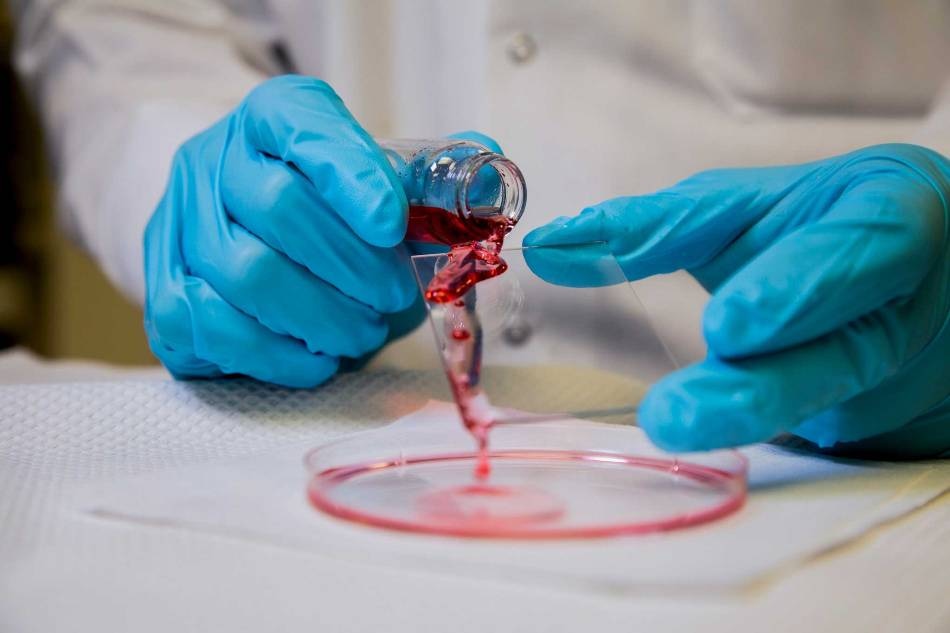Apr 12 2018
A materials science researcher at the University of Michigan has designed a smooth, durable, clear coating that quickly sheds oils, water, alcohols, as well as peanut butter. This indeed could be a step towards grime-proof camera lenses, phone screens, countertops, and numerous other daily items.
 Mathew Boban, Graduate Student Research Assistant, Materials Science, and Engineering pours hexadecane oil onto a glass slide with a superomniphobic coating. The petroleum-based, highly viscous lubricant slide easily off the slide, opening up applications like self-cleaning windows, ink jet printers, and microfluidic devices. (Image credit: Robert Coelius, Michigan Engineering)
Mathew Boban, Graduate Student Research Assistant, Materials Science, and Engineering pours hexadecane oil onto a glass slide with a superomniphobic coating. The petroleum-based, highly viscous lubricant slide easily off the slide, opening up applications like self-cleaning windows, ink jet printers, and microfluidic devices. (Image credit: Robert Coelius, Michigan Engineering)
Known as "omniphobic" in materials science jargon, the new coating repels literally every known liquid. It's the most recent in a series of innovative coatings from the lab of Anish Tuteja, U-M associate professor of materials science and engineering. The team's previous efforts produced durable coatings that repelled water and ice, and a more delicate omniphobic coating. The latest omniphobic coating is the first that's clear and durable and can be easily applied to almost any surface. Details of the coating can be found in a paper published in ACS Applied Materials & Interfaces.
Tuteja foresees the new coating as a way to stop surfaces from becoming grimy, both in home and industry. It could work on tables, floors, computer displays, and walls, for instance.
I have a 2-year-old at home, so for me, this particular project was about more than just the science. We're excited about what this could do to make homes and daycares cleaner places, and we're looking at a variety of possible applications in industry as well.
Anish Tuteja
He explains the new coating is the latest outcome of the team's systematic approach, which breaks from the traditional materials science "mix-and-see" methodology. By mapping out the essential properties of a huge library of substances, they were able to mathematically predict how any two will act when they are mixed. This enables them to fabricate a nearly infinite variety of combinations with very precisely tailored properties.
"In the past, researchers might have taken a very durable substance and a very repellent substance and mixed them together," Tuteja said. "But this doesn't necessarily yield a durable, repellent coating."
They discovered that even more crucial than repellency or durability is a property known as "partial miscibility," or the ability of two substances to blend together in precisely the right way. Chemicals that blend well together make a much sturdier product, even if they are less durable separately.
Tuning the miscibility of this specific coating posed an unusual challenge. To create a versatile coating that is optically clear and smooth enough to repel alcohols and oils, the team had to identify a repellent ingredient and a binder with precisely the right amount of miscibility, as well as the ability to stick to a wide range of substrates. They also wanted a coating that would remain smooth during processing and drying.
You can repel water with a rough surface that creates tiny pockets of air between the water and the surface, but those surfaces don't always repel oils or alcohols because of their lower surface tension. We needed a very smooth surface that interacts as little as possible with a variety of liquids, and we also needed ingredients that mix together very well, because too much phase separation between ingredients will scatter light.
Anish Tuteja
Eventually, the team discovered that a blend of fluorinated polyurethane and a specialized fluid-repellent molecule known as F-POSS would fulfill the task. Their recipe forms a mixture that can be sprayed, dipped, brushed, or spin-coated onto a wide range of surfaces, where it binds firmly. While the surface can be scratched by a sharp object, it's durable in daily use. Also, its highly precise level of phase separation makes it optically clear.
"The repellent and binder mix together well enough to make a clear coating, but there's a very small amount of phase separation between them," said Mathew Boban, a materials science and engineering graduate researcher and the paper’s author. "That separation allows the F-POSS to sort of float to the surface and create a nice repellent layer."
Tuteja is certain that the coating will be economical by the time it reaches the mass market—fluorinated polyurethane is a low-cost, common ingredient. Though F-POSS is rare and expensive currently, manufacturers are in the process of scaling it up to mass production, which should greatly lower its cost.
The research team is also doing additional studies to guarantee that the coating is harmless for use in places like daycare centers. Tuteja estimates that the coating could be commercialized within the next two years, and he is confident childproof coatings are only the beginning.
The coating could also be used in power generation, refrigeration, and oil refining—all industries that rely on the condensation of liquids. The new coating could enable equipment to slough off chemicals and condensed water more swiftly, boosting efficiency by up to 20%. That would dramatically reform those industries, which are some of the world's most high-volume and energy-intensive.
The research paper is titled "Smooth, All-Solid, Low-Hysteresis, Omniphobic Surfaces", and the research was supported by the Air Force Office of Scientific Research, Office of Naval Research and National Science Foundation. U-M and the U.S. Air Force have together filed patent applications associated with the technology.
Omniphobic Coating Tests